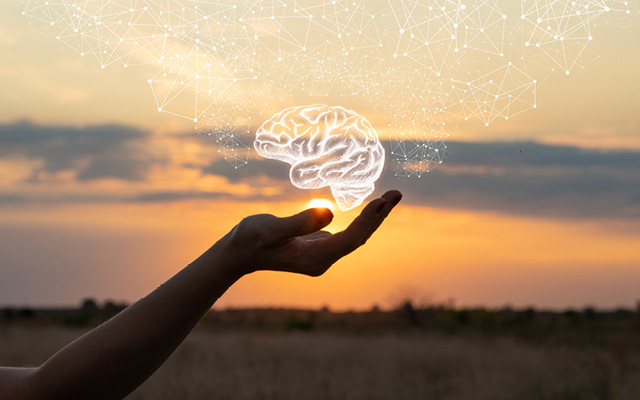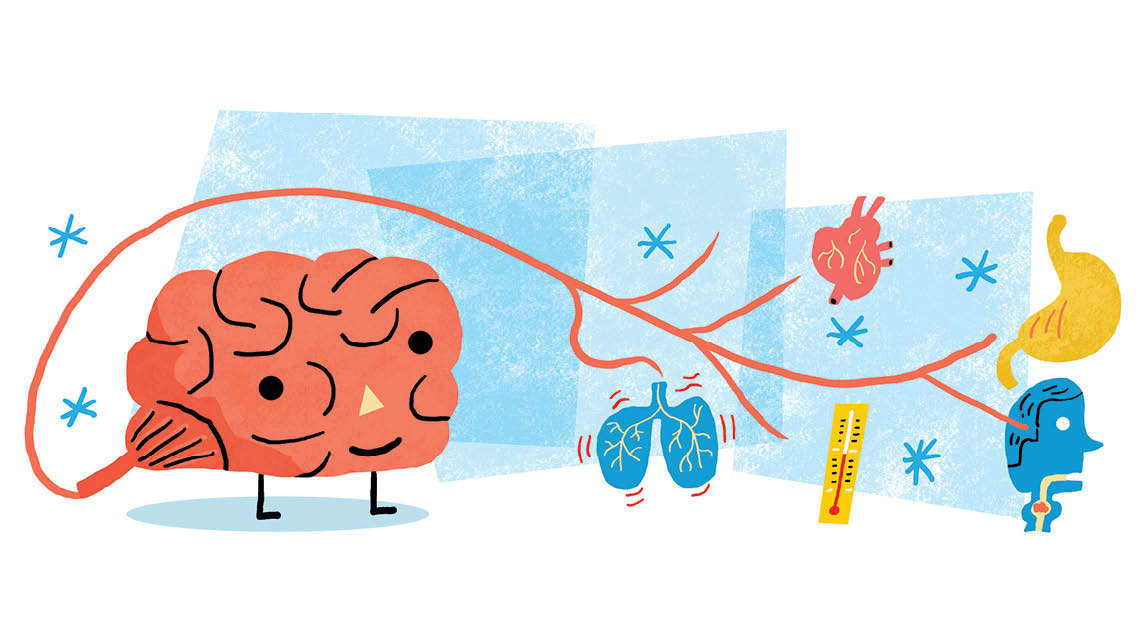Editors’ note: For more than 15 years, celebrated author and pioneering medical visionary Mark Hyman, MD, has been practicing and promoting a revolutionary healthcare concept known as functional medicine. It’s a patient-centered (vs. disease-centered) approach that focuses on identifying and addressing the root causes of chronic health challenges as opposed to merely treating symptoms. Functional medicine also emphasizes incorporating nutrition and lifestyle solutions rather than relying exclusively on pharmaceutical and surgical interventions. Experience Life is proud to bring you this six-part series in which Dr. Hyman describes the emerging practice of functional medicine and explains how it can improve your well-being.
Stress Eats Away at Your Health
One of my long-term patients came to see me after his wife died. He had suddenly developed heart failure. His heart just wouldn’t pump efficiently. What had caused this? Well, his heart was flooded with grief molecules: hormones like adrenaline, noradrenaline, cortisol and more.
This is a phenomenon known as “broken heart” syndrome. In fact, the New England Journal of Medicine recently published a study about how grief or emotional trauma can cause heart failure — literally, a broken heart!
So rather than give my patient drugs for “heart failure,” as I was taught in medical school, I suggested he receive healing touch, a form of energy and emotional healing. The result? He recovered dramatically. It was his body’s response to touch, not a pharmaceutical medication, that healed his heart.
If you find this surprising or too hocus-pocus, you’re not alone. Americans just aren’t used to viewing things this way. After all, we all learned how to read and write in school, but most of us never learned how to use our minds to help us with the most important survival skills — staying happy and healthy.
One of the biggest predictors of longevity is psychological resiliency — being able to roll with the punches life throws at you. In fact, your attitude, social network, community and spiritual beliefs are more important than cholesterol, blood sugar, blood pressure and any other risk factor in determining whether you will live a long and healthy life.
This concept isn’t new. Recently, I was browsing through my old books and found one that I read in college called Mind as Healer, Mind as Slayer. It was written by Kenneth Pelletier, MD, a friend of mine who is a leader in the field of mind-body medicine and a clinical professor of medicine at the University of California, San Francisco, and the University of Arizona. The book was published in 1977, but its basic truths remain the same.
The book states that there is a dramatic and powerful connection between the mind and body and vice versa. The word “connection” is a bit of a misnomer, actually, because it is really just one bidirectional system.
As Hans Selye, MD, the man who coined the word “stress” and first mapped out its biological effects, said, “The modern physician should know as much about emotions and thoughts as about disease symptoms and drugs. This approach would appear to hold more promise of cure than anything medicine has given us to date.”
It’s true. The most powerful pharmacy in the world is right between your ears — and also in your gut, where a “second brain” happens to reside within your intestinal system. (For more on that, see the third article in this functional wellness series, “Digestive Health.”)
What I’ll explain in this article is how the experiences we think of as happening “in our minds” very powerfully affect our bodies. The state of our bodies, in turn, powerfully affects our minds. Rather than being two separate systems, our mind and body are intertwined in subtle and sophisticated ways — ways we would all do well to understand.
Stress Eats Away at Your Health
We’ve all heard of those Tibetan monks who can control their physiology — slow their metabolism, change their heart rate and brain waves, and adjust their body temperature at will — simply by meditating. Unfortunately, most of us are not trained to address the stressful psychic loads that are the burden of the 21st century. And they are killing us.
Just consider these facts:
- Some 95 percent of all illness is caused or worsened by stress.
- Low socioeconomic status is associated with poorer health outcomes and higher risk of death from all causes. This is not related to poorer health habits, but to feelings of powerlessness and loss of control.
- Internalized stress from feeling discriminated against is associated with high amounts of belly fat.
- Stress hormones damage the hippocampus — the memory center in the brain — causing memory loss and dementia.
- In a study of people who volunteered to have cold viruses injected into their noses, only people with a high level of perceived stress got colds.
- Women with metastatic breast cancer may survive twice as long if they are part of a support group.
- Belonging to a group — a religious group, a bowling club, a quilting group, for example — reduces risk of death from all causes and increases longevity regardless of other health habits.
- In a study of doctors, those who scored high on hostility questionnaires had an even higher risk of heart attacks than those who smoked, were overweight, had high blood pressure or didn’t exercise.
The Mind-Body Connection Goes Both Ways
So we know that a tendency toward negative thinking, commonly referred to as ANTs (automatic negative thoughts) — taking everything personally, for example, or holding rigid beliefs or attitudes — can activate the stress response and trigger illness. (See “Got ANTs in Your Head?” below.) But you don’t just have to think bad thoughts to trigger this stress response. Your mind-and-brain function also is influenced by what happens in your body. Every other input into your world — an imbalance in any of the other six key systems (see “The 7 Keys to UltraWellness,” below) in your body — can trigger that same response. Unfortunately, conventional medicine mostly ignores these connections.
Let me share just one story here. A patient I saw recently was completely stressed out and anxious, had heart palpitations, and drank four martinis a night just to calm down. He also had severe muscle cramps and eye twitches, which are obvious signs of magnesium deficiency. Stress, alcohol, caffeine and sugar all deplete magnesium. He was in a vicious cycle.
What he needed wasn’t the Valium or Prozac most doctors would prescribe. Instead, I addressed why he was magnesium deficient by helping him detoxify, treating the yeast overgrowth in his gut, cutting out alcohol and caffeine, and giving him enough of the relaxation mineral, magnesium, to calm his nervous system. That, in combination with tools for calming the mind and the body, helped him reset his nervous system.
Ushering in Some Calm
But life is stressful, right? What can you really do about it? The answer is, a lot. You can change your beliefs and attitudes and their effects on your mind and your body. You may need to learn a few new skills — essential survival skills that you probably never learned in school or from your family. Most of us were never trained to calm ourselves, for example. (Unless, of course, we learned to do it with a big glass of chardonnay or hours of television.)
But the fact is, we cannot thrive without these skills — particularly in today’s society, where a runaway stress response has become such a consistent part of our daily lives that most of us don’t even realize we are in an almost perpetual state of alarm.
That is why each of us must find a way to push our pause button on a daily basis. This is key to long-term brain health. So what can you do for yourself?
Here’s my 10-step plan:
- Find the biological causes of problems in the mind. Your problem could be mercury toxicity, magnesium or B12 deficiency, a toxic gut chemical, or a gluten allergy that is affecting your brain. By changing your body, you can change your mind!
- Learn how to actively relax. To engage the powerful forces of the mind on the body, you must do something. Crafts, hobbies, relaxing exercise and meditation all work. But you can’t just sit there and watch television or drink a beer. (For more on how to actively relax, see “Take a Deep Breath, Activate Your Relaxation Response,” below.)
- Practice being calm. Try meditation, deep breathing, yoga, biofeedback, progressive muscle relaxation, taking a hot bath, making love, getting a massage, watching a sunset, and walking in the woods or on the beach.
- Exercise. It’s a powerful way to burn off stress chemicals and heal the mind, and it has been proven to be better than or equal to Prozac for treating depression.
- Clean up your diet. Eliminate mind-robbing molecules like caffeine, alcohol and refined sugars. Eat regular meals to avoid the short-term stress of starvation on your body.
- Take a multivitamin and other supplemental nutrients. Vitamin C, the B-complex vitamins such as B6 and B5 (pantothenic acid), zinc, and most important, magnesium (the relaxation mineral) all help balance the stress response.
- Use adaptogenic herbs. Used with care, ginseng, Rhodiola rosea, Siberian ginseng, cordyceps and ashwagandha can help you adapt and be balanced in response to stress.
- Take a hot bath or a sauna. It will help your body deeply relax and turn on the relaxation response. (Try my UltraBath to start.)
- Examine your beliefs, attitudes and responses to common situations. Consider reframing your point of view to reduce stress.
- Consciously build your network of friends, family and community. They are your most powerful allies in achieving long-term health.
All of these things help, and for most of us, some combination of all of them is the best approach.
There is no magic bullet — no single drug, food or therapy — that will solve our chronic health issues or the epidemic of mood, behavior, attention and neurodegenerative disorders with which our culture is now faced.
Everything is connected. We are one holistic system, and we need to understand the ecology of our body.
This type of thinking is foreign to medicine and difficult for most of us to grasp. But grasp it, we must. By the year 2025, it is estimated that major depression will be the second leading cause of medical disability in America. A different type of thinking is necessary to solve this problem.
It starts with understanding and rebalancing the root systems on which our health, vitality, clear-headedness and happiness all depend. Give this advice a try and see how a healthier mind affects your body — and how a healthier body affects your mind!
The 7 Keys to UltraWellness
Simply put, when your core systems are out of balance, they make fertile ground for the roots of illness. When they are in balance, they become the keys to creating wellness and vitality:
- Environmental Inputs (diet, lifestyle, toxins, stress and trauma)
- Inflammation and Immune Balance (the hidden fire within)
- Hormone and Neurotransmitter Balance (insulin, thyroid, adrenal balance; sex hormones and mood chemicals)
- Gut and Digestive Health (digestion, absorption, assimilation, intestinal ecosystem and the gut-immune system)
- Detoxification Imbalances and Function (getting rid of wastes and dealing with toxins)
- Creating Energy (the source of life energy and metabolism — antioxidant balance)
- Mind-Body/Body-Mind Connection (change your mind, change your body; change your body, change your mind)
Got ANTS in Your Head?
Identifying and transforming our ANTs — or “automatic negative thoughts” — is essential if we want to achieve health and happiness. In his book, Feeling Good: The New Mood Therapy, David Burns, MD, reviews 10 common ANTs — all of which have a real, physical impact on our biology. They are:
- “All-or-nothing” thinking
- Overgeneralization — if one bad thing happens, then everything is bad or doomed to go poorly
- Negative mental filter — a tendency toward ingrained pessimism, the opposite of “rose-colored glasses”
- Jumping to conclusions
- Personalization — taking everything personally
- Disqualifying the positive — ignoring or downplaying good things that happen
- Magnification — making things worse than they are
- Emotional reasoning — assuming your negative emotions reflect how things really are, e.g., “I feel guilty, so I must be a bad person.”
- “Should” statements
- Labeling and mislabeling — making incorrect assumptions about things
Take a Deep Breath
Activate your stress response.
Take a deep breath into your belly, counting to five, pause for one second, then breathe out slowly to another count of five. Keep your belly soft. Put down the magazine and do this five times. Then keep reading.
You have just activated the vagus nerve, which extends from your brain through your neck, into your chest and through your diaphragm. So, when you take a deep breath and relax and expand your diaphragm, your vagus nerve is stimulated, you instantly turn on the parasympathetic nervous system, your cortisol levels are reduced and your brain heals.
This whole experience is called the relaxation response. The opposite of the stress response, the relaxation response is necessary for your body to heal, repair and renew. There are many ways to activate the vagus nerve and turn on the relaxation response, but this simple breathing exercise is an easy one to incorporate into your daily life, anytime, anywhere.
Learn more about the fundamentals of functional wellness by reading the other articles in this six-part series:




This Post Has 0 Comments